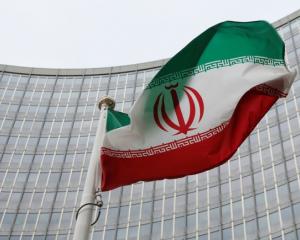
Troops advanced for the first time into the al-Mawasi district near the Mediterranean Coast, west of Khan Younis, the main city in southern Gaza. There, they stormed the Al-Khair hospital and were arresting medical staff, Gaza health ministry spokesman Ashraf al Qidra told Reuters.
There was no word from Israel on the situation at the hospital, and the military spokesperson's office had no comment. The military said later in the day that three of their soldiers were killed on Monday in southern Gaza.
Qidra said at least 50 people were killed overnight in Khan Younis, while the sieges of medical facilities meant dozens of dead and wounded were beyond the reach of rescuers.
"The Israeli occupation is preventing ambulance vehicles from moving to recover bodies of martyrs and the wounded from western Khan Younis," he said.
The Palestinian Red Crescent said tanks had surrounded another Khan Younis hospital, al-Amal, headquarters of the rescue agency, which had lost contact with staff there.
"We are deeply worried about what is happening around our hospital," said Tommaso Della Longa, spokesperson for the International Federation of Red Cross and Red Crescent Societies.
"Ambulances cannot go in or out and we cannot provide any emergency health care to people in the area.”
Israel says Hamas fighters operate in and around hospitals, which Hamas and medical staff deny.
Elad Goren of COGAT, the Israeli defence ministry branch that coordinates with the Palestinians, added that: "A particular effort led by a dedicated team has been put on making sure civilians have access to medical care."
Residents said the bombardment from air, land and sea was the most intense in the southern sector of Gaza since the war began in October.
Video filmed from afar showed scattered civilians wandering around a ghost city crowded with tents, abandoned laundry flapping on lines as gunfire rattled and smoke rose into the sky.
Israel launched an offensive last week to capture Khan Younis, which it now says is the principal headquarters of the Hamas militants responsible for the Oct. 7 attacks on southern Israel that killed 1,200 people, according to Israeli tallies.
PENNED IN
The newest phase of the war has brought fighting deep into the last corners of the enclave packed with those fleeing bombardment. At least 25,295 Gazans have been killed since Oct. 7, Gaza health authorities said in an update on Monday.
Most of Gaza's 2.3 million residents are now penned into Rafah just south of Khan Younis and Deir al-Balah just north of it, crammed into public buildings and camps of tents made from plastic sheets lashed to wooden frames.
Lines of cars and donkey carts piled high with belongings pushed south as Gazans sought to flee the bombardments.
"This is the seventh time I get displaced," said Gazan Mariam Abu-Haleeb, weeping in a car surrounded by her possessions.
Ahmad Abu-Shaweesh, a boy, described sheltering in the Al-Aqsa University only to find it coming under attack.
"We hardly made it out... We didn't expect the tanks at the university's gates."
HOSPITAL BURIAL
Gaza has had no communications or internet service for 10 days, hampering ambulance dispatches to areas targeted by Israel and preventing people from checking on one another and on the whereabouts of Israeli forces.
At Nasser Hospital, the only major hospital still accessible in Khan Younis and the largest still functioning in Gaza, video showed the trauma ward overwhelmed with wounded being treated on a floor splashed with blood.
Ahmed Abu Mustafa, an emergency doctor, said he hadn't slept for 30 hours and was treating 10-11 patients in an intensive care unit with four beds.
Outside, men dug graves within the hospital grounds because it was not safe to venture out to the cemetery. Authorities said 40 people were buried there.
In Brussels, Palestinian Authority Foreign Minister Riyad al-Maliki told reporters the situation in Gaza was out of control and asked the European Union to call for a ceasefire.
"The health system has collapsed. There is no way for injured Palestinians to be treated in the Gaza strip and they are not able to leave Gaza for treatment outside."
Israel says it will not stop fighting until it annihilates Hamas. But Palestinians and some Western military experts say that objective may be unachievable given the group's diffuse structure and deep roots in Gaza, which it has ruled since 2007.
Though Israelis overwhelmingly support the war, a growing number led by relatives of the remaining hostages say the government should do more to reach a deal to free them, even if that means reining in its offensive.
About 20 relatives of hostages stormed a parliamentary committee session in Jerusalem on Monday, demanding lawmakers do more to help free their loved ones.
Prime Minister Benjamin Netanyahu told a group of relatives there was no truth to reports of a deal to free hostages in a ceasefire.
"I am saying this as clearly as I can because there are so many incorrect statements which are certainly agonising for you," Netanyahu's office quoted him as telling them.
Sami al-Zuhri, head of Hamas' political unit in exile, told Reuters on Monday Hamas was open to "all initiatives and proposals, but any agreement must be based on ending the aggression and the occupation's complete withdrawal" from Gaza.












